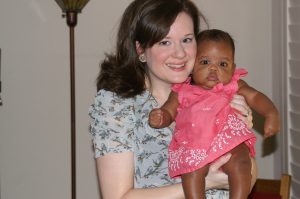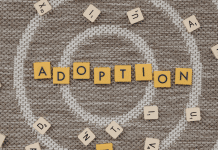As we wait for our second child via adoption, I encounter friends and even family members who want to inquire about the process or other elements of adoption but aren’t quite sure what to say or what to ask. Most sensible people know adoption can be a sensitive issue, so they are leery of speaking up; and for the most part, our American culture has not been widely educated about the ins and outs of adoption. So, it totally makes sense that what to ask when and how to ask are questions many do not know how to pose.
Friend, let me help.
The truth is most questions about our daughter and/or about our hoped for second child are okay. They are asked with genuine concern, harmless curiousity, and the best dern intentions possible.
But, the inquiries usually go a little like this:
- I’m not sure how to say this . . . .
- Wait, that’s not what I meant.
- Do you know what I mean?
Like many things, the way a phrase is coined or the words used make all the difference. Much of the offensive or negative comments or fumbled questions about adoption can be corrected by simply knowing and using the better, the “proper” word choices.
What’s the big deal? Why does positive adoption lingo matter?
It’s true. We hear a lot about being politically correct . . . about what to say and not to say to mothers of all types . . . about how to best interact with joggers, mail carriers, dog sitters, electricians. (Okay, my attempt at funny is flopping.) You get the point, right?
I get it. And loathe it at the same time.
But historically, in our culture, adoption gets a bad rep; and the best way to change that is to understand what adoption really is–the glorious, the painful, and the normal.
The Adoptive Families of America sum it up so well, “By using positive adoption language, you will reflect the true nature of adoption, free of innuendo. Positive adoption language can stop the spread of misconceptions such as these. By using positive adoption language, we educate others about adoption. We choose emotionally neutral words over emotionally laden words. We speak and write in positive adoption language with the hopes of impacting others so that this language will someday become the norm.”
Here’s an example (or two):
A common phrase used to describe a child whose birth parent chose adoption for him or her is: put up for adoption. “This girl was put up for adoption.” Ever wonder where “put up for adoption” came from? It’s kind of a weird phrase.
Between 1854-1934, approximately 150,000-200,000 children were loaded onto trains in the eastern United States and shipped west. These journeys are often identified as orphan trains, mercy trains, and/or baby trains. Some of these children were literal orphans, some were street kids, some were children of prostitutes, some were children of single parents.
In most efforts, permission was sought before the shipment of kids. But the overarching purpose of these orphan trains was to populate the West, rid east coast of “hooligans and urchins,” and provide a better future for the children. Some parents, who struggled to make ends meet, chose this option for their children, believed the West offered hope and a new start.
Newspapers would publicize the types of children on the trains, what stops the trains would make, etc. The train would make several stops on its route. Then in something like an auction, at each stop, the children would be placed on platforms, boxes, etc., for townspeople people to choose what child they wanted—reminiscent of the sell of slaves or the purchase of a pet/livestock. Some were actually adopted and included/accepted into a family. Some simply became indentured slaves, a ranch/farm hand at best.
Thus, the origin of “put up for adoption.” This social experiment—the orphan train years—created the basis of the cultural stigma for adoption in our country.
Can you believe we still say “put up for adoption” decades later? That we still associate the adoption of a child with an auction? But most folks do so not because they equate kids with cattle; most truly have no clue such a negative conotation is connected to the phrase. Through changing adoption lingo, though, this can be remedied! Yay!
Another example is the delicate difference between the terms real parent and birth parent. Can you understand from a child’s vantage point how confusing this could be?
 I am my daughter’s real parent. We function like a real family. We feel like a real family. We are a real family. The truth of our situation is that our little gal has birth parents, who gave her life and delivered her into this world. But in terms of function and feeling, my husband and I are her real parents. Yet, her birth parents are not less important. We are not less important than they. But we have two very different roles in her life. By using birth parent, it not only helps adopted children understand who is who, but it also depicts a more truthful, clearer picture of the adoption triad.
I am my daughter’s real parent. We function like a real family. We feel like a real family. We are a real family. The truth of our situation is that our little gal has birth parents, who gave her life and delivered her into this world. But in terms of function and feeling, my husband and I are her real parents. Yet, her birth parents are not less important. We are not less important than they. But we have two very different roles in her life. By using birth parent, it not only helps adopted children understand who is who, but it also depicts a more truthful, clearer picture of the adoption triad.
Adoption Lingo Laid Out
This is not an exhaustive list BY ANY MEANS, but gives a good overview of the most common terms and phrases. (Oh, if you have any questions about why one term is preferred over another, I’d be dee-lighted to explain.)
It’s better to use:
- Birth parent, not real parent
- Birthfather, not biological father
- Birthmother, not biological mother
- Birth child, not own child
- My child, not adopted child; own child
- Terminate parental rights, not give up or put up
- Make an adoption plan (chose adoption for), not give away (gave away)
- Decide to parent, not decide to keep
- Waiting child, not adoptable child or available child
- Make contact with (birth family), not reunion/reunite
- Parent, not adoptive parent
- International adoption, not foreign adoption
- Adoption triad, not adoption triangle
- Child placed for adoption, not an unwanted child
- Court termination, not child taken away
(Just a quick Google of “positive adoption language” will pull up a whole host of links with essentially the same information, give or take a few. If you’re interested in learning more about adoption lingo, click here and here and here.)
Using these terms when speaking about adoption not only gives respect and value to the birth parents and the parents of the child, but it also–and even more important–shows respect and value to the child.















Great article Emily! And I’m praying Baby #2 comes quickly!
Thank you for sharing this! I try very hard to be sensitive to others, and know many families who have chosen adoption. Yet, you brought new ways to discuss adoption in a better way to the forefront. I hope baby #2 arrives soon!
I agree Emily! As a mother of both adopted & biological children, I hate when people ask me which kids are mine. They are all mine! How they became my kids my be different, but they are all mine. Also, we refer to their birth parents positively. They chose life over abortion & gave my husband & I the opportunity to be blessed by these wonderful little individuals.
Home Run! As usual, Emily. Even though I’ve been walking the adoption road for twenty years now, sometimes I make a stupid mistake with my lingo. But one thing is for sure, I’ve never felt anything other than my son’s real father, nor do I refer to myself as anything less.
I haven’t heard before that the phrases including “biological” are not preferred. Why is this so? “Biological” seems so straightforward and accurate, to me. I hadn’t considered that it could be offensive somehow? Thanks for the education! 🙂
Lianna, that’s a great question! As I read through the post again, I should have also included “real mother” and “real father” in the same instance as “biological.” Of course, using “real” is the term that’s most confusing for a child . . . and really doesn’t accurately define that person’s role. Birth mother/father is preferred over “biological” because it’s more honest. Birth indicates genetics and something more: giving life to, nurturing. Birth parents provide more than genes. So birth mother/father is actually a term to honor them and more accurately defines the role. It is also, quite frankly, less harsh/less science-y of a term. Certainly, biological will not be as offensive or confusing as using “real.”
Of course, this also gets tricky with embryo adoption . . . . but that’s another post for another time.